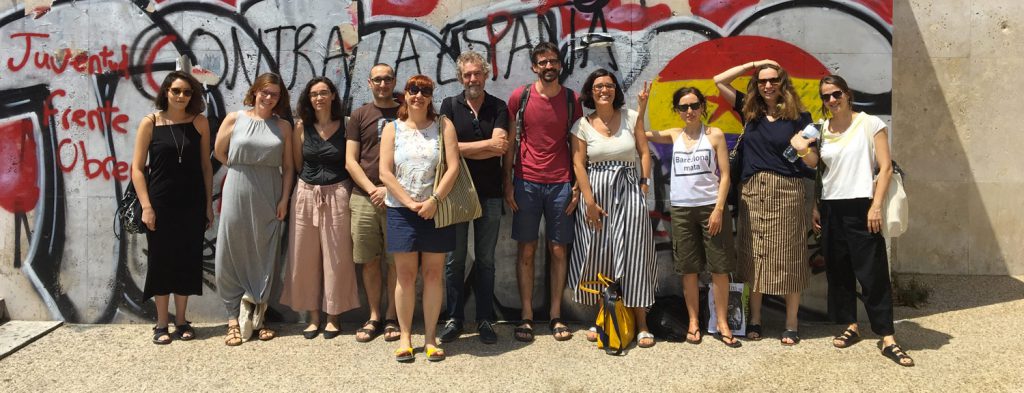Workshop MoDe(s)2 – Critical imaginaries and expanded semantic fields from the Cold War to contemporaneity #2
Universidad Complutense de Madrid
Facultad de Geografía e Historia
18-19 July 2019
The workshop “Critical imaginaries and semantic fields expanded from the Cold War to contemporaneity #2“, held at the Complutense University of Madrid on 18 and 19 July 2019, was conceived as a space to promote and organise the work of researchers in the framework of the project MoDe(s) 2. One of the main objectives of the project, as previously discussed in the workshop Critical imaginaries and semantic fields expanded from the Cold War to contemporaneity (Robledo de Chavela, July 2018), is to draw up a glossary of concepts that allow us to understand the cultural tensions that are going through the Cold War and that continue to reverberate in contemporary times. In this sense, each researcher presented in this workshop the concept around which he/she is going to work in the next year, taking the following questions into account:
- Why is the concept significant for understanding contemporaneity and the processes linked to the Cold War?
- What artistic practices would help to construct the history of the concept?
- What are the semantic changes of the concept and the relationship with its practices? What points of inflection can be pointed out in the evolution of the concept in question? What synonyms, clusters or constellations of terms are related to the concept?
- How is the concept inserted in the perspective developed by MoDe(s) 2 and what relationship does it have with the present?
The workshop was divided into three blocks. The first one is Imaginaries of decolonizers and Third Worldists: Revolutionary Agents and Agencies. Within this framework, Jaime Vindel traced a route based on the concepts of “organization / revolution / entropy”, in which he tried to elucidate what we can learn today from the non-aligned culture, with respect of the current ecological crisis. Paula Barreiro López proposed a revision of the concept of “solidarity” that was based on the internationalization of the struggles during the Cold War, in order to explore the connections between the imaginaries of resistance in very distant political contexts. María Ruido‘s work, which will include the production of a short documentary, is based on the concepts “revolution / counter-revolution”, basing itself on the Portuguese political transition. Closing this block, María Íñigo exposed some guidelines for thinking about the concept of “popular culture” in the Brazilian context, taking into account indigenous epistemologies (“popular knowledge”) that can transform the approach around such a politically connoted term.
In the second block, Imaginaries of the Cultural Cold War: Institutions and Practices Emerging from the New World/Colonial Order, Olga Fernández López proposed an analysis of the notion of “publics”, which will start from the analysis of a broad corpus of photographs, more or less close to the humanist aesthetic – very widespread during the Cold War – in which the public can be seen in modern art exhibitions. Following on from the territory of exhibition history, Anita Orzes will work on the concept of “biennialization”, for which she presented a detailed analysis of the history/evolution of biennials, established several “biennial formats” and pointed to some key quotes from which to think about the milestones in the transformation of the concept, and the evolution of its formats and their historical meaning. In a connection from Buenos Aires, and connecting with her research in the framework of MoDe(s) 1, Fabiana Serviddio proposes a revision of the concept of “Latin Americanism”, which is a key term in the construction of a differentiated artistic consciousness in the continent.
In the third block, Counter-revolutionary and neoliberal imaginaries: subjects and new projections of collective identity, Juan Albarrán has discussed the development of the concept of “subjectivity” and the evolution of performative practices since the 1960s. Giulia Lamoni outlined a journey through experiences carried out by artists – mainly in Brazil and Portugal – on whom to think about the concept of “radical pedagogy”. “The New” is the category around which Julián Díaz Sánchez will develop his research. “Seeming new”, in several senses, became an imperative during modernity. The cycle of the new seems to be exhausted in a post-historic time with the irruption of retro aesthetics. Finally, focusing on the context of the socialist republics of Eastern Europe, Juliane Debeusscher will analyse the concept of “marginality” as a category strategically assumed by artists.
After each presentation, the concept has been discussed by the research team. It is likely to be modified – or to be paired or confronted with other concepts – before or during the research process. In the debate, multiple connections arose between the problems exposed throughout the two days, and it became clear that the work that is now being started does not attempt to exhaust each of the concepts proposed. The aim is not to make an exhaustive journey – which, in many cases, would be inexhaustible – but to generate meaning around each concept from a meditated selection of artistic and discursive milestones.

